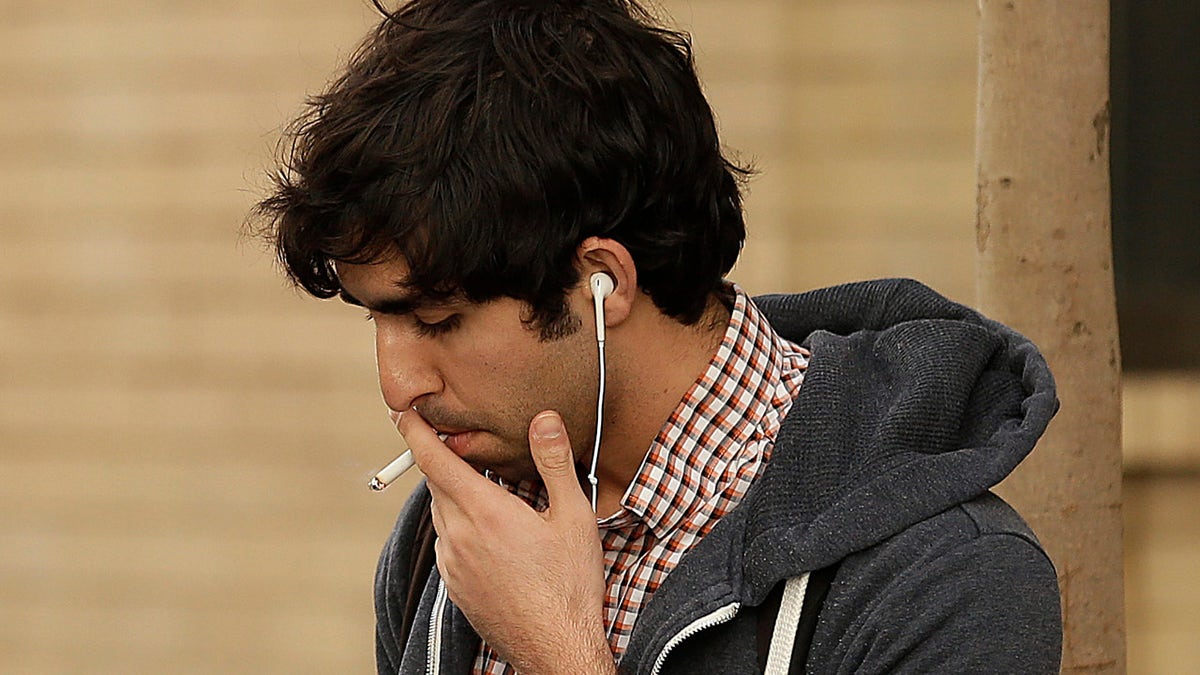
March 1, 2016: A man smokes a cigarette in San Francisco. (AP/Ben Margot)
SACRAMENTO, Calif. – The governor of California on Wednesday approved raising the legal age to buy tobacco for smoking, dipping, chewing and vaping from 18 to 21.
Democratic Gov. Jerry Brown said he signed the measure along with four others restricting tobacco use in various ways.
Supporters of the law regarding age aimed to deter adolescents from the harmful, sometimes fatal effects of nicotine addiction. The Institute of Medicine reports that 90 percent of daily smokers began using tobacco before turning 19.
In April, Hawaii became the first state in the nation to raise the legal smoking age to 21 and more than 100 local jurisdictions around the country have made the change, including New York, Chicago and San Francisco.
Brown's media liaisons provided no immediate comment on the governor's actions.
Sen. Ed Hernandez, D-Azusa, author of the bill to raise the legal age, expects other states to follow the lead of California.
"It's going to send a shockwave across the country," Hernandez said.
Anyone who gives tobacco or tobacco paraphernalia to someone under 21 could be found guilty of a misdemeanor crime.
Under the new law, 18-20-year-olds will no longer be allowed to buy tobacco in California starting on June 9.
Veterans organizations and Republican lawmakers in California objected to the bill, saying people old enough to die for their country are old enough to use tobacco.
The California proposal stalled for six months until lawmakers agreed to retain the 18-year-old tobacco age for military personnel and passed it in early March.
The Institute of Medicine reported in March 2015 that increasing the smoking age to 21 would immediately deter 15 percent of people 18-20 from taking up a lasting tobacco habit.
The study , conducted at the request of the U.S. Food and Drug Administration, found that raising the minimum smoking age above 20 "will mean that those who can legally obtain tobacco are less likely to be in the same social networks as high school students."
Brown, a Democrat, has signed laws banning the sale of e-cigarettes to minors and reining in the use of tobacco at day care and community facilities.
Brown was out of public office when California became the first state in the nation to ban smoking in public places in 1995 then expand the law in 1998. He did not chime in publicly on 1998, 2006 or 2012 ballot initiatives that sought additional fees on cigarettes.
New York Mayor Michael Bloomberg donated $500,000 to support the 2012 initiative, which was heavily outspent by tobacco interests and narrowly defeated.
Altria, the parent company of Philip Morris, gave $54,000 to Brown's 2014 re-election campaign.
Anti-tobacco groups are collecting signatures to raise cigarette taxes from $0.87 per pack to $2. They notified state officials in February that they've collected at least 25 percent of the 535,407 signatures they'll need to place the question on the November ballot.
Brown also signed bills to regulate electronic cigarettes, set annual tobacco license fees, push for all charter schools to be tobacco free and expand existing requirements for tobacco-free workplaces to include small businesses, break rooms and hotel lobbies. He vetoed a bill that would have allowed local governments to establish tobacco taxes.

